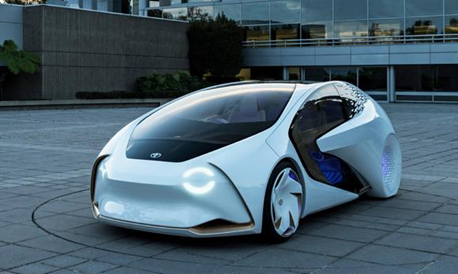
According to foreign media reports, Japanese automakers are scrambling to develop artificial intelligence-based driving assistance systems as smart networks open up new driving experiences. Mitsubishi recently launched an artificial intelligence assistant system (AI Personal Assistant system) called Risa, and Toyota is developing a concept car called Concept-i. Risa was unveiled at the Yokohama 2017 Automotive Engineering Expo in May. The system uses advanced technology and a camera to understand the driver's physical and emotional intent and condition and to provide relevant information.
Muneyoshi Namba, senior director of vehicle technology development at Mitsubishi, said other automakers are developing similar artificial intelligence systems, but Risa is unique. Risa is the first system to help drive a car that allows cars to receive information from outside the car. To this end, Risa is combined with the Softbank Group's humanoid robot Pepper to better understand drivers and passengers.
For example, while the owner of the family is driving the whole family, he asks Pepper, who stays at home, what the best route a family wants to go to tomorrow. In addition to responding to this question, Pepper will also use the information he or she knows about the family to provide other advice, such as recommending restaurants along the way for all family members. Combining data from Pepper or other external sources with the conversations and images Risa collects in the car will improve the accuracy and relevance of the information provided by the people in the car, making the vehicle more than just a means of transportation.
Risa also improves security and uses a camera to monitor drivers for sleepiness, concentration and other conditions. If the driver is tired, Risa will recommend a break.
Toyota has also developed a driver assistance system that combines artificial intelligence with autonomous driving technology. The system has been deployed in the new Concept-i and debuted at the Las Vegas Electronics Show in January 2017 (Consumer). Electronics Show). The system monitors the external environment and the physical and emotional state of the driver through cameras and other means. If the driver's anxiety or fatigue is detected and the driver's ability to maneuver the car is uncertain, the system will advise the driver to switch the car to the automatic driving mode. In dangerous situations, such as a vehicle accidentally deviating from the lane, the system automatically switches the car to autopilot mode to correct the wrong driving behavior.
Founded in 2016, the Toyota Research Institute is also involved in the development of Concept-i. Toyota plans to strengthen system development and plans to test a Concept-enabled car on the Japanese road in the next few years.
In addition to driverless cars, artificial intelligence may also be used in motorcycles and other fields. The key to the development of mass-produced artificial intelligence driver assistance systems is to work with other companies and procurement talent. In 2016, Honda opened a research center in Tokyo to serve as a channel between Toyota and its potential partners. In April of this year, Honda R&D Division established an organization responsible for the development of artificial intelligence, robotics and related projects.
Mitsubishi hopes to launch Risa to help find partners. Mitsubishi related people said: "We now want to cooperate with venture capital companies in Silicon Valley and other parts of the world."
Asic Power Supply,High Power Uninterruptible Power Supply,Active Computer Power Supply,4000W Computer Power Supply
Boluo Xurong Electronics Co., Ltd. , https://www.greenleaf-pc.com
